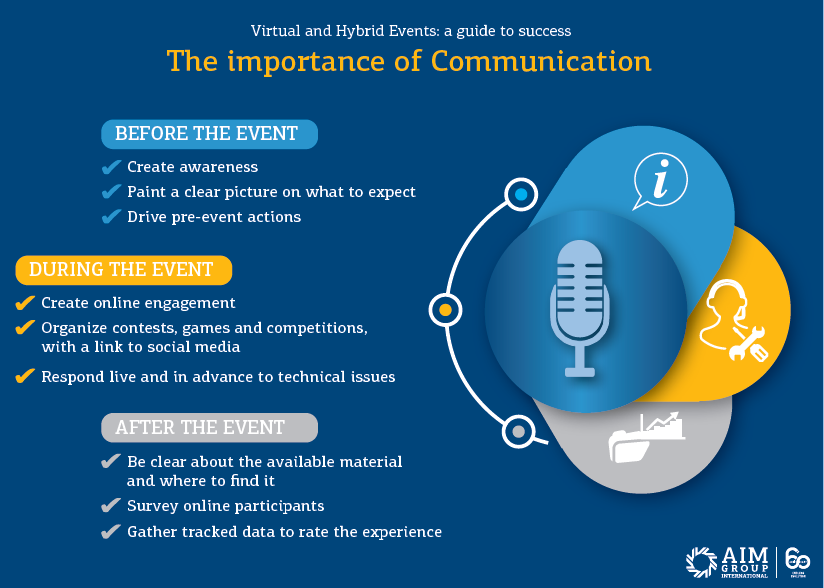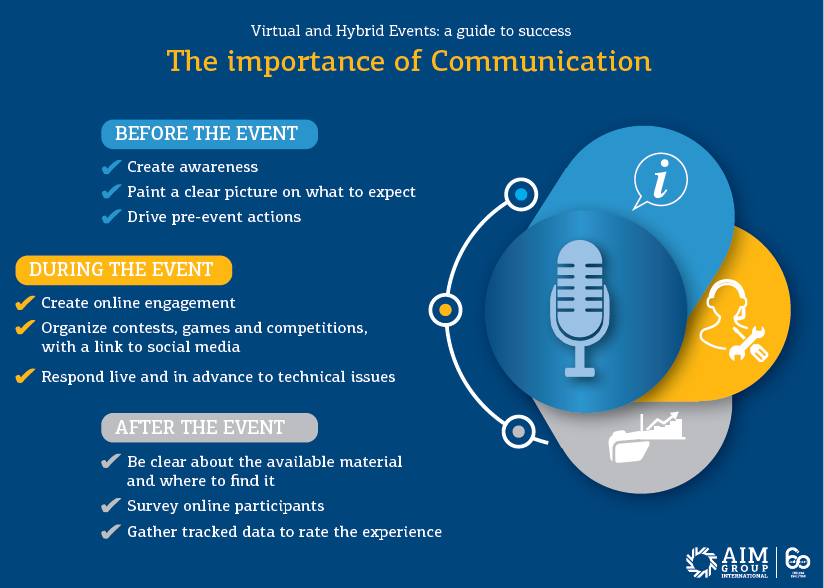
15-07-2020
Virtual and Hybrid Events: a guide to success 5/7
The importance of Communication before, during and after the virtual event.
When moving to a new digital format, it is crucial to promote the event and gain attention, reliability and trust from your target audience and engage users throughout their journey. Here are some tips on how to be effective pre-, during and post the event. Let’s see what the opportunity is for event marketers:
BEFORE THE EVENT:
- Create awareness amid the huge amount of online resources – there is so much noise out there, but this does not mean that our virtual event should not be showing up among the best our audience can get online!
- Respond in advance to possible concerns – an offline audience is used to packing their suitcase and being ready for some days of nice face2face networking. Digital channels are there for them to answer all of their possible concerns before going live.
- Paint a clear picture on what to expect – as mentioned, offline audiences are not used to this kind of experience, so stating clearly what they should expect means being transparent, while building Trust.
- Drive pre-event actions – leading a potential delegate through his/her digital journey (download an application or register properly, etc…) is a good way to make sure everything is set, so that the online experience can start flawlessly.
DURING THE EVENT:
- Balance the value of having registered with the value of keeping connected – depending on how much of the content is being made available after the event, it will be crucial to continue to underline the importance of keeping connected or encouraging people to enjoy the content on demand. Assurance is another important driver to Trust!
- Create online engagement – networking and knowledge sharing is what offline audiences love from live events. Therefore, engagement needs to be offered online using all of the available platforms: website, virtual event platform, virtual exhibition area, social media, push notifications, direct emails, virtual engagement platforms, polls etc…
- Boost user engagement and excitement during their journey – Organize contests, games and competitions, where outcomes can be shared directly on attendees’ social media pages with bespoke hashtags. It will create excitement during and after the virtual event experience.
- Respond live and in advance to technical issues – technical issues and general doubts can damage the interest in live sessions, so be ready to solve these problems in advance and during live sessions and promptly respond with solutions.
AFTER THE EVENT:
- Be clear about the available material and where to find it – one of the most frequent concerns is whether slides, resources and materials are available on demand, where to find them, how long they remain accessible and what the password is. Digital channels should keep showing clear answers to these frequently asked questions for some time after the event has finished.
- Survey online participants – the actual sentiment of an audience can be recorded with a survey. Fast and frequent surveys can be done both during and after the event to get fresh feedback on how delegates are living it.
- Gather tangible data to rate the experience – digital data is some of the most reliable data for correct measurement. Collecting final data on the virtual experience (number of streams, visitors, traffic, downloads, engagements, etc…) will be crucial to make a final assessment on the success of the new event format.
Whether before, during or after a virtual event, digital marketing strategies are crucial to demonstrate Transparency, to inspire Reliability and to build Trust. Needless to say, the latter is the ultimate Key to Success!

– TO BE CONTINUED –
Want to meet? engage? think?
Let’s work together!
©2025 AIM Group International - All rights reserved - VAT 06486081000

